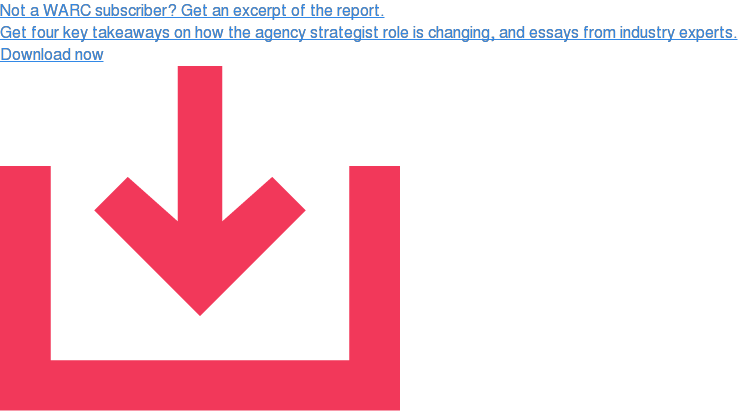This commentary appears in WARC’s new ‘Future of Strategy’ report, based on a global survey of senior agency planners. The report covers the current state of the strategic discipline, future opportunities and challenges, and guidance on building the planning team of the future.
I’ve helped integrate strategy teams at two agencies now. And, each time, it’s been a two-stage process.
First, you need complete buy-in from management and agency stakeholders. The process will cause disruption and confusion, and people in organisations do not like change. All of the management team needs to appreciate that if you are transforming the strategy team, you are in effect transforming the agency. So integrating strategy teams can’t happen in isolation of a wider effort to integrate all disciplines and departments. The pressure for change and innovation will confront all areas of our industry.
Second, you start to bring in people of different disciplines to your team of account planners: they could be from digital, data, CRM and direct, from within the agency, or through hiring externally. At the same time you broaden the team’s remit to “strategy” rather than what I think is the more confining term “planning”. We think in terms of generalists and specialists and how we blend these skills.
Currently, I’m the head of a department of 10 at FCB. Day by day, my job is to choreograph our resources to solve problems. That’s more work but way more exciting because as a genuinely integrated team we can exploit the power of complementary skillsets.
This means I can cast the lead strategist on a specific account depending on their unique experience. For example, for a big tech-oriented brand, the lead strategist would have a strong digital background, and would be supported by more of a generalist. On the other hand, a classic FMCG client used to developing its marketing around some very set disciplines – such as market segmentation and positioning – would be led by a generalist who is used to that style of working. In this example, a digital specialist could play a support role – and build their skillset by supporting their team mate.
You should expect some challenging conversations with team members, existing and new. Integration is a significant leadership challenge. And you can’t underestimate the emotional intelligence required for a diverse team to really build trust. It involves setting a clear vision for the team, a great deal of coaching, a lot of active role-modelling of behaviour, and lots of positive affirmation that the team is on the right track. Even when things, inevitably, don’t go to plan or there are issues.
I’ve found that for those generalists, change can provoke a fear of being left on the shelf: a generalist might ask, if there are all these digital, direct, channel and data strategists coming into my team, does that mean my skills are obsolete? Or they might feel that the agency doesn’t have a “proper planning” team any more – that it’s turning into an island of misfit toys!
At FCB, we have been able to offer roles to people who were in other departments. For example, a digital creative director came in to the team as a senior digital strategist. That is really exciting because we can use those hybrid skills to link strategy to digital creative a lot quicker in projects. But it did prove unsettling for other team members, and prompted questions from those in other departments.
On the flip side, I’ve also had some frank conversations with team members whose specialisms are in digital or direct – when they were feeling a bit nervous about engaging with “the brand stuff”. But they are hungry to learn, smart and they pick it up, both through training and exposure alongside the rest of the team, and they come to practice wider marketing and strategy with greater confidence.
Looking ahead, progressive clients understand the power of having teams that are better integrated and that can genuinely blend different types of strategic advice. It makes their lives easier in an ever more connected and complicated world. And it produces more effective and enduring solutions.
It’s actually better for a CRM strategist to take the lead on a CRM project than a generalist like me bluffing their way through. With an integrated team I can, in essence, say to the client: “I’m not an expert on CRM, but I know somebody who is.” Then they can rip into the project, get it done, and I can act as a consultant.
I concede that my agency, which has media in-house, is an unusual example. I’m very lucky and privileged to work in this rare environment. It’s the way it should be but, for the most part, isn’t.
I think progressive marketers will increasingly demand the best integrated thinking. If they can’t find this with a single agency, they will demand this from their direct, brand and media agencies, breaking down the barriers between them, and attempting to build a “brains trust” across different agendas and P&Ls to get more integrated work.
But genuinely effective integration across agencies is really hard to achieve and rare in my experience.


